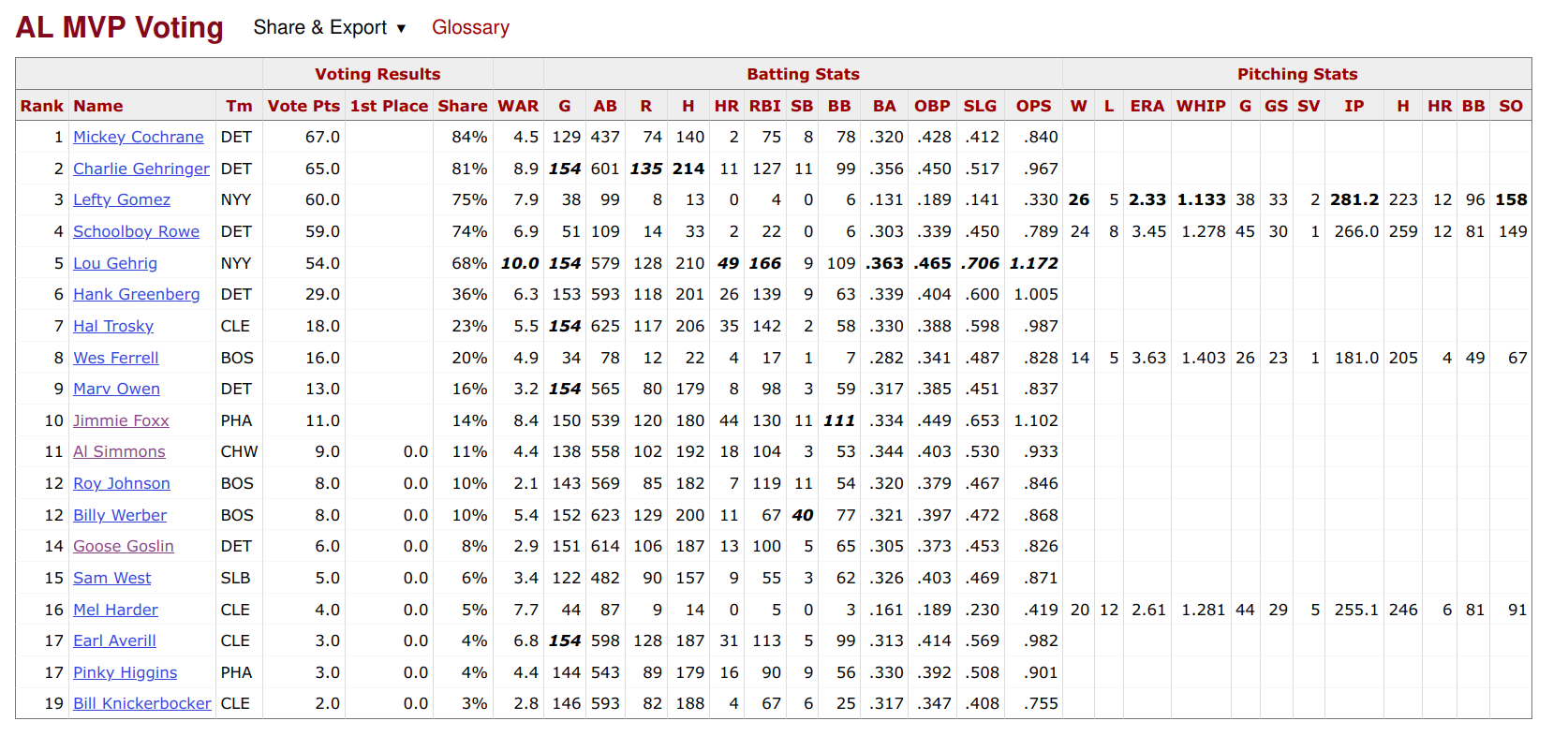The Gehrig Screwjob
A recent post on the Replay Sports Games Delphi forum got me curious:
Now, I’m not going to begrudge Ol’ Diz the National League MVP award in 1934. It’s not easy going 30-7 — and it’s a lot harder when you guarantee that you’ll win 30 at the start of the season.
However, Lou Gehrig not winning the MVP award in 1934 really had me curious.
Some believe that this was due to a rule prohibiting players from winning the MVP award twice. There was a rule like this back in the 1920s in the American League, as Wikipedia tells us:
This, by the way, is the reason why Gehrig won in 1927 instead of Babe Ruth. Ruth was ineligible to win, having previously won in 1923.
And what’s up with George Burns in 1926? But we might come back to that one another day.
That rule went away in 1930, however. In fact, Jimmy Foxx won two years in a row, in 1932 and 1933:
Which begs that old question again. What in the world happened in 1934?
Well, the first thing to note is that This Date In Baseball History is wrong. The MVP award was issued in mid-October 1934, not on November 3:
The New York papers indicate that the award was issued on October 18, though I’ve also seen some papers from October 18 with a similar article. My guess is that the evening papers on October 18 picked up the story.
The other interesting thing here is that it wasn’t a particularly close contest. Check out the voting:
Now, anybody who knows anything about baseball history will tell you that it’s not really fair to rank these guys based on WAR. There was no WAR back in 1934, of course.
But, seriously, sportswriters in 1934 knew that 49 home runs was more than 2. Fans of the sport at the time would have seen 166 RBIs as incredibly impressive. Hitting .363 instead of .320 is a big advantage. And, of course, playing in 154 games is harder than playing in 129 — though playing catcher is no easy feat.
But the crazy thing here is that Gehrig finished a distant 5th place. He even finished behind Lefty Gomez, whose two losses in September certainly didn’t help the Yankees catch Detroit:
The other bizarre thing is that none of the newspapers made a big deal out of this. I haven’t found a single contemporary article about how Gehrig was screwed out of the award.
Well, one of the things we forget about is that The Sporting News had its own league specific MVP awards. It’s listed on Wikipedia, but only the most dedicated students of the history of the game know that this was a thing.
Guess who won that one?
Gehrig, incidentally, won this award by a pretty comfortable margin:
And, yes, the New York newspapers picked up on this award as soon as it was announced:
That’s probably why Gehrig’s BBWA snub didn’t resonate much. Gehrig had already won an MVP award, after all.
This also makes me wonder why Baseball Reference only lists the BBWA award winners. Honestly, there’s good evidence that baseball pundits and fans took the award from The Sporting News much more seriously in those days.
Keep that in mind the next time you get in an argument about who the best player in the 1934 American League was. And, if you’re not routinely getting in those kinds of discussions, you should probably change your circle of friends.













The way I'm reading that TSN article, the eight writers could only vote for one member of each team, their "most valuable". So players on a team like Detroit where there was no general agreement as to their most valuable were doomed to also-ran status. (The vote count from the Sporitng News, which you didn't reproduce, would have given the number of votes -- first, second, third, etc. -- for each player, which would allow me to confirm or reject that reading. FWIW, the three Detroit players, Cochrane, Gehringer and Rowe, combined for 63 points, more than Gehrig and (presumably) Gomez.)